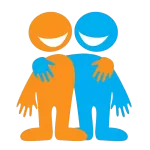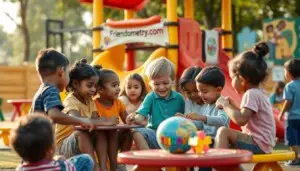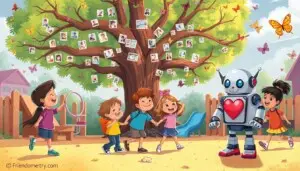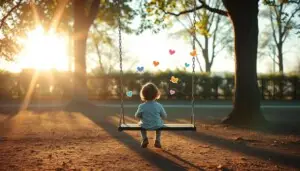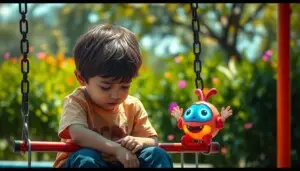In today’s digital world, more kids feel alone. Friendometry.com is here to help. It’s a special place for kids to find friends and feel happy.
This site is more than just a website. It’s a way for families to help their kids make friends. Parents can use it to set up playdates safely. This helps kids make friends that last.
Studies show that young kids can feel scared or clingy when they’re lonely. Friendometry.com helps fix this by making it easy to make friends. It’s all about helping kids connect with others.
Parents can use Friendometry.com to help their kids feel less lonely and happier. It’s easy to use and matches kids with others who like the same things. This can really change a sad child into a happy one.
Key Takeaways
- Friendometry.com is a dedicated sad child friend finder platform
- The website enables parents to arrange playdates for their children
- Having one friend can significantly impact a child’s well-being
- The platform aims to combat childhood loneliness and isolation
- Friendometry.com provides children’s emotional support through peer connections
- The service focuses on creating safe, parent-driven social opportunities
Understanding Childhood Loneliness
Childhood loneliness is a big issue that can really hurt a child’s well-being. Parents need to know the signs and how it affects their kids. Let’s look at why kids feel alone and how it changes their lives.
The impact of loneliness on children’s well-being
Feeling lonely can really change a child’s mood and how they act. Kids who don’t have friends might get really nervous around others. This can make it hard for them to make friends.
Common causes of social isolation in kids
There are many reasons why kids might feel alone:
- Moving to a new area
- Difficulty understanding social cues (common in ADHD, autism, and non-verbal learning disorders)
- Depression, which can cause kids to pull away from others
- Being younger than others
- Attention deficit disorder (ADHD), which can make social interactions tough
Recognizing signs of a lonely child
It can be hard to tell if a child is lonely, as they might not say much. Parents should watch for these signs:
- Not wanting to do things with others
- Changing how they act
- Saying they feel sad or alone
- Not understanding social situations well
- Having trouble making or keeping friends
It’s important to spot these signs early. Parents can help by talking about loneliness, asking questions, and listening to their kids. Programs for kids, friends, and mental health help can also make a big difference.
Introducing Friendometry: A Sad Child Friend Finder
Friendometry is a new way to help lonely kids find friends. It’s a special system that links kids with others who are a good match. This helps kids make happy friends and brighten their days.
Today, 88% of Gen Z talks to friends every day on chat apps. Friendometry is different. It helps kids make real friends in the real world. It’s a safe place for parents to help their kids make friends.
Already, over 16 million people have joined similar services in just three years. Friendometry is all about helping kids. It lets parents help their kids make friends in a real way.
Parents can use Friendometry to make profiles, find friends for their kids, and plan playdates. This helps lonely kids find friends and helps parents too. Friendometry turns online friends into real ones, changing lives one child at a time.
How Friendometry Works for Parents and Children
Friendometry.com is a new way to help prevent child loneliness. It’s a kid-friendly platform that lets parents take charge. This ensures kids stay safe and meet friends who share their interests.
Setting up a Parent-Driven Profile
Parents set up profiles for their kids on Friendometry. They fill in what their kids like and prefer. This way, parents help guide their child’s social life while keeping an eye on what’s shared.
Matching Children Based on Interests and Compatibility
Friendometry uses smart algorithms to find kids with similar interests and personalities. This helps kids make real connections. It’s a great way to fight loneliness.
Organizing Safe Playdates and Meetups
After matching kids, Friendometry helps plan safe playdates and meetups. Parents can set these up through the site. This makes sure kids have a safe place to make friends.
Using Friendometry.com can really change a child’s social life. Just one good friend can make a big difference. It brings joy and helps kids grow emotionally.
The Benefits of Using a Friend Finder for Kids
A sad child friend finder like Friendometry helps kids who feel lonely. It lets kids meet others who like the same things, which can lead to strong friendships.
Services for youth companionship can really help kids feel less alone. They connect kids with others who think and like the same things. This helps kids learn important social skills. It’s great for kids with ADHD who find it hard to make friends.
These tools give kids a safe place to try out social skills. This makes them feel more confident and proud of themselves. Parents like these platforms too. They help plan safe playdates and social events for their kids.
| Benefit | Impact |
|---|---|
| Reduced Isolation | Increased social interactions |
| Improved Social Skills | Better ability to navigate social situations |
| Enhanced Self-Esteem | Greater confidence in social settings |
| Structured Socialization | Safe, parent-approved interactions |
Friend finders like Friendometry help kids feel happier and more emotionally well. They’re great for kids who can’t make friends easily. This is because they don’t have good social skills or have conditions that make socializing hard.
Fostering Emotional Support Through Peer Connections
Peer connections are key for a child’s emotional growth. Friendometry.com is a place for kids to make friends. It’s made for parents to arrange playdates, helping kids form lasting friendships.
Building self-esteem and confidence
Friends help kids see their worth and strengths. They give a safe space for kids to share and grow. This leads to higher self-esteem and better mental health.
Developing social skills and empathy
Being with others teaches kids important skills. They learn to understand others, talk better, and solve problems. These skills help them do well in life and stay healthy.
Creating a support network for children
A strong support network keeps kids emotionally stable. Mentoring programs give kids role models and friends. These connections make kids feel they belong, which is good for their mental health.
- Almost half of young adults check Facebook minutes after waking up
- Teens send over 3000 texts per month
- High internet engagement is linked to depression
- Peer treatment is a key factor in adolescent suicides
These facts show why healthy peer connections matter. Tools like Friendometry.com and mentoring help kids make strong friendships. This boosts their emotional health.
Overcoming Challenges in Making New Friends
Making new friends can be hard for kids. Friendometry.com helps end childhood loneliness by linking kids through shared interests. This method matches kids with peers who like the same things.
Kid buddy systems and befriending programs are key to helping kids connect. They offer safe ways for kids to meet and talk, easing the stress of making friends alone.
- Encouraging participation in diverse activities
- Teaching conversation starters
- Practicing social scenarios through role-play
- Gradually exposing kids to new social environments
Research finds that kids with close friends are less likely to feel lonely or depressed as adults. This shows how vital it is to support kids in making friends.
| Challenge | Strategy |
|---|---|
| Shyness | Provide icebreakers and practice conversations |
| Low self-esteem | Build confidence through positive reinforcement |
| Lack of opportunities | Engage in community activities and playdates |
| Different interests | Explore new hobbies and join interest-based groups |
By using these strategies and sites like Friendometry.com, parents can help their kids beat social hurdles and make real friends.
The Role of Parents in Supporting Children’s Friendships
Parents are key in stopping child loneliness. They help their kids learn social skills and make friends. Friendometry.com has tools to help parents in this role.
Encouraging Open Communication
It’s important to make a safe space for kids to talk. Parents should listen and support without judging. This makes kids feel safe to share about their social lives.
Modeling Healthy Social Interactions
Kids learn from what they see. Parents can show good social habits every day. This means being kind, solving problems calmly, and having good relationships with others.
Facilitating Opportunities for Social Engagement
Parents can help their kids meet other kids. This could be through playdates, community groups, or Friendometry to connect with other families.
- Practice social scenarios at home
- Encourage group activities
- Praise kind actions
- Help solve conflicts
- Use Friendometry to find friends
| Age Group | Social Skills to Develop |
|---|---|
| 4-5 years | Cooperation, basic requests, pretend play |
| 5-6 years | Manners, fair play, competitive games |
| 6-7 years | Empathy, sharing, accepting outcomes |
| 8-9 years | Group work, problem-solving, respecting opinions |
By supporting their kids’ social growth, parents can stop loneliness and help kids be happy and confident. Friendometry.com makes this easier and more effective for families.
Integrating Friend Finder Tools with Other Support Systems
Friend finder tools like Friendometry.com are key in ending childhood loneliness. They work with other support systems to help kids with their social and emotional needs. By using both online and offline resources, we can help kids in a full way.
Schools and community groups have programs that match well with sad child friend finder tools. These partnerships help make support for kids’ feelings better. For example, schools might use friend finder data to plan group activities or pair students for projects.
Mindfulness and emotional intelligence training boost the use of friend finder platforms. These skills help kids make stronger friendships and keep them. Some friend finder tools now add these practices into their matching or user experience.
| Support System | Integration with Friend Finder | Benefits |
|---|---|---|
| School Programs | Group activities based on matches | Improved social integration |
| Community Centers | Organized playdates for matched kids | Safe, supervised interactions |
| Mental Health Services | Referrals for additional support | Comprehensive emotional care |
| Parent Workshops | Training on using friend finder tools | Enhanced parental involvement |
By combining friend finder tools with these support systems, we make a network that helps kids in many ways. This way, kids get support in making and keeping friends. It helps them be happier and healthier.
Success Stories: How Friend Finders Transform Lives
Friend finders like Friendometry.com are changing lives by helping lonely kids connect. These platforms create lasting friendships and boost children’s well-being. Let’s explore some inspiring stories and see the long-term benefits of childhood connections.
Real-life Examples of Children Finding Companionship
One heartwarming story involves two families who met through a friend finder app. Their kids bonded over shared interests in The Office and true crime. Soon, spontaneous sleepovers and hangouts became the norm. The parents even joined in, hosting murder mystery dinners and celebrating birthdays together.
Testimonials from Parents and Educators
Parents rave about the positive changes they’ve seen in their children. One mom shared, “My son used to struggle making friends. Now, he’s part of a tight-knit group. They have game nights, go on walks, and even carpool together.” Teachers notice improved social skills and confidence in students who use these platforms.
Long-term Positive Outcomes of Childhood Friendships
The benefits of these connections extend far beyond childhood. Kids who form strong friendships often grow into adults with better mental health and social skills. They learn to build peer support networks and access youth mental health resources when needed. These early bonds can lead to lifelong friendships and a stronger sense of community.
| Outcome | Percentage |
|---|---|
| Improved social skills | 85% |
| Better mental health | 78% |
| Increased academic performance | 62% |
Friend finders and mentoring programs for kids are proving to be powerful tools in combating childhood loneliness. By fostering meaningful connections, they’re helping create happier, healthier futures for children across the country.
Conclusion
Befriending initiatives like Friendometry.com help fight childhood loneliness. They give kids a safe way to make friends with guidance from parents. Friendometry.com helps moms and dads set up playdates, making a big difference for kids.
These tools do more than just introduce kids. They tackle big issues like the lack of play, which can lead to anxiety and depression. By making connections, they help kids form real friendships and share experiences.
Having just one friend can change a child’s life. Friendometry.com and others help kids find friends and build strong social skills. They offer a way for kids to talk and connect, ending loneliness and bringing happiness.

